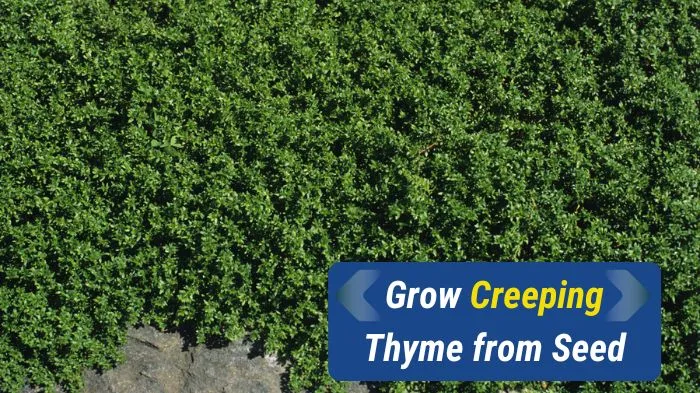Grow Creeping Thyme From Seed: Creeping thyme is a bushy herb with small, delicate leaves and a creeping habit. It’s perfect for growing in containers or planters and makes an excellent ground cover if you’re looking to establish it in your garden bed. Creeping thyme can be grown from seed, but it does have some specific growing requirements. When sowing the seeds, you should be prepared to provide ample humidity and warmth for them to germinate and grow successfully. If you’re new to growing plants from seed, read 7 tips you need to know about how to grow creeping thyme from seed.
Choosing the Right Thyme Seed
When growing creeping thyme, it’s important to make sure you’re using the right seeds. Look for a pure creeping thyme seed, and avoid seeds that may have been cross-pollinated with another species. Creeping thyme germinates best in the spring, so you’ll want to select seeds from spring-grown creeping thyme. Whenever you think about planting thyme, first of all, be sure to check its favourable temperature. If you’re having trouble getting your creeping thyme seeds to germinate, try increasing the temperature of the soil or providing a soil heating pad.
Prepare the Soil
You can sow creeping thyme seeds directly into the soil, but it’s best to start your seeds indoors. This will give you a head start on the growing season, and you’ll be able to nurture your plants to a larger size before they are transplanted outdoors. When growing creeping thyme plants or flowers from seed, choose soil that has excellent drainage. Creeping thyme has small, delicate leaves and likes a well-drained soil that is rich in organic matter. Prepare your soil by adding compost or a commercial plant soil mix.
Take Care of the Sunlight
When growing creeping thyme from seed, choose a well-lit location for your indoor growing pot. Creeping thyme does best in full sunlight, so if you’re growing indoors, make sure you’re giving it the light it needs. If your indoor growing environment isn’t getting enough sunlight, you can supplement it with artificial light. Artificial light can be helpful when growing creeping thyme from seed. When you’re growing indoors and it’s not warm enough to transfer your plants outside yet, artificial light is a good way to provide the light creeping thyme needs to thrive.
Add a Support
If you are planning to plant thyme indoors, you can place your seeds in pot trays or containers and attach them to bamboo supports to make the plants grow taller. Growing Creeping Thyme is not a difficult task, so do not consume much energy under its care. If you are planning to grow creeping thyme outside in the garden and they grow a lot in the future, you can build a wall-like structure around the growing plants. You can use a small bamboo stake or a wooden stake to prop up the plants as they grow larger.
Maintain Growth With Pruning
Growing creeping thyme from seed will eventually produce a full and lush plant bed. As your plants mature, they will get bigger and succulent. Eventually, the creeping thyme plants will become very full and thick, which can make harvesting the leaves difficult. After growing thyme from seeds, you should cut them from time to time because harvesting is very important which will keep them good. This will make harvesting the leaves much easier and they will become denser. You can also prune away dead or diseased branches to keep the plant bed clean and healthy.
Maintain thyme plants Spacing
When growing creeping thyme from seed, you’ll eventually have to thin the plant bed. Creeping thyme does best when grown in a dense planting. This allows the thyme plants to grow fuller. As the creeping thyme plants grow larger, you’ll have to thin the plants to maintain their spacing. If you have planted thyme plants outside your house or house, then cut them after they reach 2 inches. This may be when it will be easiest to remove them without damaging the other plant bed.
Water in Creeping Thyme
When growing creeping thyme from seed, you’ll want to make sure you’re giving the plants enough water. While creeping thyme tolerates dry soil conditions well, it also likes to be kept moist. This will help the creeping thyme plants germinate and grow successfully. When growing creeping thyme from seed, water the plant bed when the top 1 inch of soil feels dry. Be careful not to overwater creeping thyme, as this can cause root rot. If you’re growing creeping thyme in a container or pot, check the soil and water when it feels dry. Avoid watering the soil in containers and pots when it’s wet as this will cause the soil to become waterlogged and create an environment that is too soggy for creeping thyme.
READ MORE:
Conclusion
Growing creeping oregano from seed is very easy, but it does require a few key requirements. When sowing the seeds, you should be prepared to provide ample humidity and warmth for them to germinate and grow successfully. When growing creeping thyme from seed, make sure you select pure creeping thyme seeds and provide an environment that’s warm, humid, and has plenty of sunlight. Hope this post has been helpful for you, if you are fond of reading similar posts, then you can read other articles on our ((usagardenshop.com)) blog.
